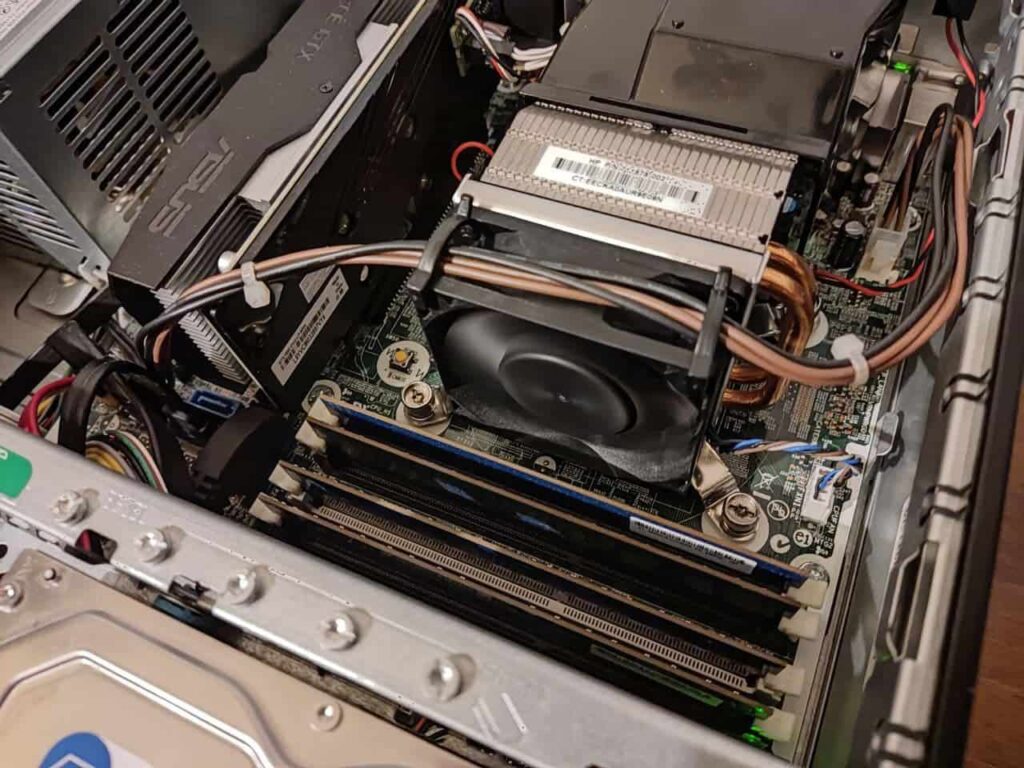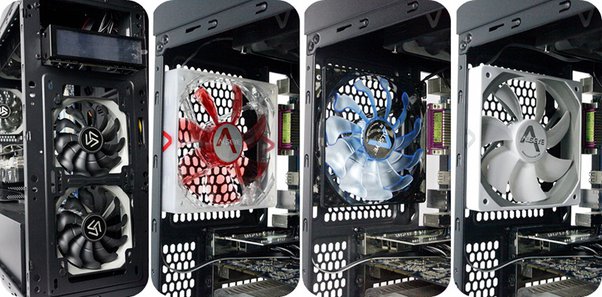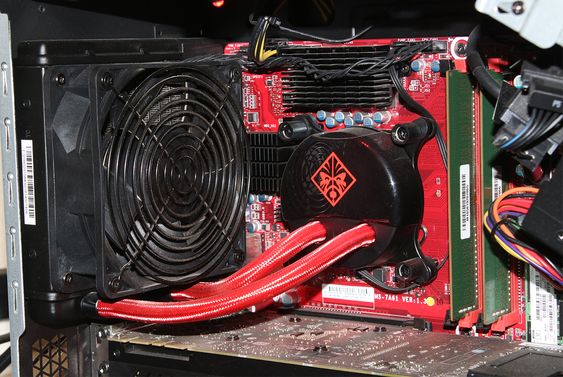CPU fans are crucial for keeping your computer cool. If you’re an HP user, you might wonder, “Are most HP CPU fans interchangeable?”
Most HP CPU fans are not interchangeable due to differences in size and design. When replacing your HP CPU fan, compatibility factors must be considered. Always check specifications to ensure a proper fit for optimal cooling performance.
In this article, we’ll explore the details of HP CPU fans, their compatibility, and factors to consider when choosing a replacement.
What Are CPU Fans?
A CPU fan is a slight cooling device inside a computer. It sits on top of the processor and helps keep it cool by pushing hot air out of the system. This helps prevent overheating and keeps your computer running smoothly and safely.
Why Are CPU Fans Important?
CPU fans are essential because they prevent the processor from overheating. When the CPU overheats, it may slow down or shut off. The fan cools down, helping the computer stay fast and avoid potential damage.
HP CPU Fans Overview

HP CPU fans are explicitly designed for HP computers, helping keep processors cool in laptops and desktops. These fans vary by model, size, and type, but they all work to maintain safe operating temperatures and ensure stable and efficient performance.
The Role of CPU Fans in HP Laptops and Desktops
In HP laptops and desktops, CPU fans help manage temperature by expelling heat generated by the processor. This cooling function is essential for HP devices to maintain smooth performance and prevent slowdowns or damage from overheating, keeping the device reliable for everyday tasks.
Standard vs. Custom Fans in HP Devices
Standard HP fans are built to fit specific models, while custom fans can be added for specialized needs, like better cooling or quieter performance. Although standard fans work well for most users, custom fans are an option for those seeking enhanced cooling or unique setups.
Interchangeability of CPU Fans:
1. Are CPU Fans Standardized Across Models?
CPU fans need to be fully standardized across HP models. Each model often has a unique fan design to match its size, power needs, and cooling requirements, making it essential to verify compatibility for any fan replacement or upgrade.
2. Factors That Influence Compatibility
Compatibility between CPU fans depends on size, mounting bracket type, and electrical connections. Matching these factors with the original fan’s specifications ensures proper fit and function, preventing potential overheating or performance issues.
Also Read: Can Cinebench Damage CPU – Tips For Safe Cinebench Usage!
Design and Mounting Considerations
1. Mounting Bracket Types
HP uses different mounting brackets across devices. Mounting brackets secure the fan to the CPU, and if the brackets differ, the replacement fan may not fit correctly. It’s crucial to check the bracket type for compatibility.
2. Fan Size and Dimensions
Fan size and dimensions must align with the device’s design. HP fans vary in size to accommodate different case sizes and cooling needs. Ensuring the new fan matches these dimensions is critical for effective cooling and a secure fit.
Electrical Connections
1. 4-Pin vs. 3-Pin Connectors
HP fans might use either 3-pin or 4-pin connectors. The 4-pin connectors allow precise speed control, while 3-pin fans run at a fixed rate. Always check which type your device uses for a smooth replacement.
2. Voltage and Wattage Requirements
Different fans require specific voltage and wattage to function well. Using a fan that doesn’t match your HP device’s power needs can cause overheating or fan failure. Always check voltage and wattage requirements when swapping CPU fans.
Cooling Solutions in HP Devices

1. Stock vs. Aftermarket Cooling Solutions
HP’s stock cooling fans are designed for each model’s unique needs, while aftermarket fans offer more performance and noise control choices. Although aftermarket fans can improve cooling, always check compatibility to avoid any issues with fit and functionality.
2. Benefits and Drawbacks of Interchanging CPU Fans
- Improved Cooling Performance: Aftermarket fans can offer enhanced cooling, keeping your CPU temperatures lower during intense use.
- Reduced Noise: High-quality fans often run quieter than standard ones, creating a more pleasant workspace.
- Extended Hardware Life: Better cooling can reduce wear on your CPU and other components, extending lifespan.
- Customizable Features: Many aftermarket fans come with adjustable speeds and even LED lighting for added personalization.
- Better Efficiency: Improved airflow and cooling efficiency can support smoother overall performance, especially in high-demand tasks.
Also Read: Very High CPU Load, But Nothing Significant In Top – Read It
Noise Levels and Efficiency
1. How Fan Noise Levels Vary
Fan noise varies based on design, speed, and cooling power. Larger, slower-spinning fans are generally quieter, while smaller, high-speed fans may be louder. Balancing cooling needs with noise levels helps create a pleasant and efficient computer experience.
2. Impact on Cooling Efficiency
Efficient fans improve cooling by circulating air quickly and evenly, keeping the CPU at safe temperatures. This reduces the risk of overheating, ensures reliable performance, and helps prolong the life of your device’s components.
Key Challenges in Fan Interchangeability
1. Warranty Concerns
Replacing a CPU fan could void your warranty, especially if it’s not HP-approved. If you’re worried about warranty protection, checking with HP support or using official replacement parts can keep your coverage intact.
2. Potential for Overheating
Using an incompatible fan can lead to overheating. If a replacement fan doesn’t match your device’s cooling needs, the CPU may struggle with temperature control, risking damage to internal components over time.
BIOS and Firmware Compatibility
1. How HP’s BIOS May Limit Fan Options
HP’s BIOS sometimes limits fan choices to maintain optimal performance. Fans outside of HP’s approved list might not spin or may trigger error messages. Sticking with HP-compatible fans helps avoid this limitation.
2. The Role of Thermal Sensors
Thermal sensors track the CPU temperature and adjust fan speed to prevent overheating. These sensors work with the BIOS to manage cooling, ensuring a balance between performance and noise for better device health.
Choosing the Right Replacement Fan
1. How to Identify Compatible Fans
Check your device’s model number and cooling specifications to identify compatible fans. HP’s support resources or online forums can help you find models that match your device’s requirements, avoiding fit and functionality issues.
2. Researching HP’s Specifications
HP often lists CPU fan specifications in manuals or online support pages. Reviewing these can help you confirm the size, mounting type, and other vital details before purchasing a replacement to avoid compatibility problems.
Finding Reliable Aftermarket Options

1. Where to Purchase Replacement CPU Fans
Replacement fans for HP devices can be found on sites like Amazon and Newegg or directly from HP’s official store. Local electronics stores may also carry options compatible with HP, providing convenient ways to get reliable parts.
2. Brands Known for HP Compatibility
Brands like Cooler Master, Noctua, and ARCTIC offer fans compatible with HP models. These brands are known for quality and often have fans with varied sizes and power ratings that meet HP’s requirements.
Must Read: CPU Maximum Frequency Always 100 – Easy Fixes You Can Try
User Experiences with Interchanging HP CPU Fans
1. Common Issues Users Face
Common issues include fan size mismatches, connector incompatibility, or BIOS errors. Users sometimes find that non-HP fans may not work or trigger errors, so checking details in advance helps prevent these problems.
2. Success Stories and What We Can Learn from Them
Many users share success stories of quieter, more efficient fans in HP devices, especially with high-quality aftermarket fans. Learning from these experiences shows that upgrading or replacing fans can improve noise and cooling with the proper research.
CPU Fan Replacement
Replacing a CPU fan can help keep your computer cool and running smoothly. Make sure you have the right fan for your model. Then, follow step-by-step instructions to safely remove the old fan and install the new one.
Replace CPU Fan Without Heatsink
You can replace a CPU fan without removing the heatsink, but it’s easier if you do. If you’re careful and manage the connections, you might be able to swap fans while leaving the heatsink in place.
Can You Change the Fans on a CPU Liquid Cooler?
Yes, you can change the fans on a CPU liquid cooler. Just make sure the fans you select fit the radiator. Swapping them can improve airflow and cooling performance, but ensure they’re correctly connected afterward.
Do I Need a CPU Cooler If My Case Has Fans?
Yes, you still need a CPU cooler, even if your case has fans. Case fans help with overall airflow, but a CPU cooler specifically manages the CPU’s temperature, which is crucial for performance and longevity.
How to Remove Fan from CPU Cooler
To remove a fan from a CPU cooler, first, unplug it from the motherboard. Then, carefully unscrew or unclip it from the cooler. Avoid damaging parts, and follow the manufacturer’s instructions for best results.
FAQs
1. Are CPU Coolers Interchangeable?
Yes, some CPU coolers are interchangeable, but you need to check compatibility. Not all coolers fit every CPU socket.
2. Can I Replace the CPU Cooler Fan with a Case Fan?
You can replace a CPU cooler fan with a case fan, but make sure the size and airflow are compatible for effective cooling.
3. Can I Replace AIO CPU Cooler Fans with Case Fans?
Yes, you can replace AIO CPU cooler fans with case fans as long as they fit and match the necessary cooling specifications.
4. Can You Swap CPU Fans?
Yes, you can swap CPU fans, but ensure they fit the cooler and match power requirements. Compatibility is essential for performance.
5. How to Know if a CPU Fan is Compatible?
Check the fan size, connector type, and airflow specifications. Manufacturer guidelines can help you determine if a CPU fan is compatible.
6. Are Aftermarket CPU Fans Universal?
Not all aftermarket CPU fans are universal. Check compatibility with your cooler and CPU socket to ensure a proper fit.
7. Does It Matter What CPU Fan I Get?
Yes, it matters. Choosing the right CPU fan affects cooling efficiency, noise levels, and overall system performance. Always prioritize compatibility.
8. Can Any Fan Fit Any PC?
No, no fan can fit any PC. Size, mounting options, and connector types vary, so check compatibility before purchasing.
9. Are All CPU Fans Compatible with All Motherboards?
No, not all CPU fans are compatible with all motherboards. Ensure the fan fits the motherboard’s fan headers and power requirements.
10. How Do I Know What CPU Fan to Buy?
Look for fans that match your cooler’s size and specifications. Check reviews and compatibility guides to find the best option.
Conclusion
In conclusion, understanding HP CPU fan compatibility is vital for effective cooling. Most HP fans aren’t interchangeable due to differences in size and design. Always check specifications and compatibility factors to ensure optimal performance and prevent overheating for your device.



